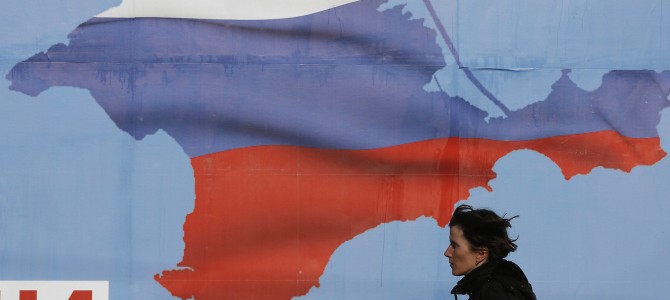There is no political obstructionism in the Russian Federation – a state of affairs that must make good-government types here in the United States envious.
Without gridlock, Russia is blessed with extraordinarily high levels of bipartisanship – scratch that, transpartisanship. And we’re not talking about a few moderates jumping ship to create the illusion of compromise. Democratically elected leaders are governing. Things get done. And they get done quickly. On March 18, Russian President Vladimir Putin asked the parliament to pass a bill to incorporate Crimea and Sevastopol into Russia. On March 19, after the Foreign Minister moved the treaty and urged lawmakers for their support. It passed on a vote of 443 to 1. Ilya Ponomarev, the soon-to-be-former representative from Novosibirsk was the only crack in unity. I hope the guy stays safe.
By March 21st, Putin had his treaty signed and Crimea was Russia.
Without a strong minority voters are awash in self-determination. Without any true division of power, courts function under a weak and malleable constitution and crony plutocrats work closely with Moscow for the collective good. There is little economic uncertainty and lawmakers are able “accomplish” much without hassle. The Russian Constitution, for example, already guarantees a citizen the right to free healthcare and medical assistance provided by the state. Not us. 1918 called, it wants its debate back.
In general, I’m not comparing the ambitions of Barack Obama and Putin. But Russian politics offers us another lesson on why gridlock is more useful than destructive. The Founders erected an elaborate system of checks and balances to impede the flood of power, bad ideas, and passions, the exigency of overcoming “gridlock”—the “fierce urgency” to get things done, as Obama might put it, seems trumps all other concerns here at home. Polarization in Washington is an organic safeguard against one party’s ability to fundamentally changing the institutions of the country, yet we’re schooled to be repelled by it. In a 2013 Gallup poll 78 percent of Americans disapprove of the way Congress was handling its job. The top concern offered was partisan gridlock. Other polls find that upwards of 95 percent have negative view of the GOP congress – who they blame for creating gridlock when, in fact, a diverse electorate is the guilty party.
Putin’s reprehensible play in Crimea exposes some of the problems with our knee-jerk support for majoritarianism, both internationally and domestically. It should be noted that Crimean Prime Minister Sergei Aksyonov is leader of the “Unity” party. And today, he actually enjoys unity. Over 95 percent of the Crimean voters voted “yea” in the referendum to secede from Ukraine and rejoin Russia. From what I’ve gathered listening to Washington over the past 15 years, self-determination is a worthwhile enterprise. If 90 percent of voters demand action — say on gun control – it is, as the Democrats have often argued, unconscionable not to move forward. Why shouldn’t Crimean voters have their way? History didn’t begin yesterday, after all. How can you be a Wilsonian idealist one day, and decide that borders are forever static stationary the next? Peter Baker lays our shifting position in the New York Times:
Consider the different American views of recent bids for independence.
Chechnya? No.
East Timor? Yes.
Abkhazia? No.
South Sudan? Yes.
Palestine? It’s complicated.
It is an acutely delicate subject in the West, where Britain wants to keep Scotland and Spain wants to keep Catalonia. The United States, after all, was born in revolution, breaking away from London without consent of the national government — something that the Obama administration insists Crimea must have.
If we support the “Palestinian people’s right to self-determination,” as Obama, and other administrations, have argued, why not the ethnic Russians of Crimea? There’s a perfectly good reason to oppose both, of course. But there are things we should value more than self-determination and “democracy”? Yes – over there, and here at home.
David Harsanyi is a Senior Editor at The Federalist and author of the The People Have Spoken (and They Are Wrong): The Case Against Democracy. Follow him on Twitter.









